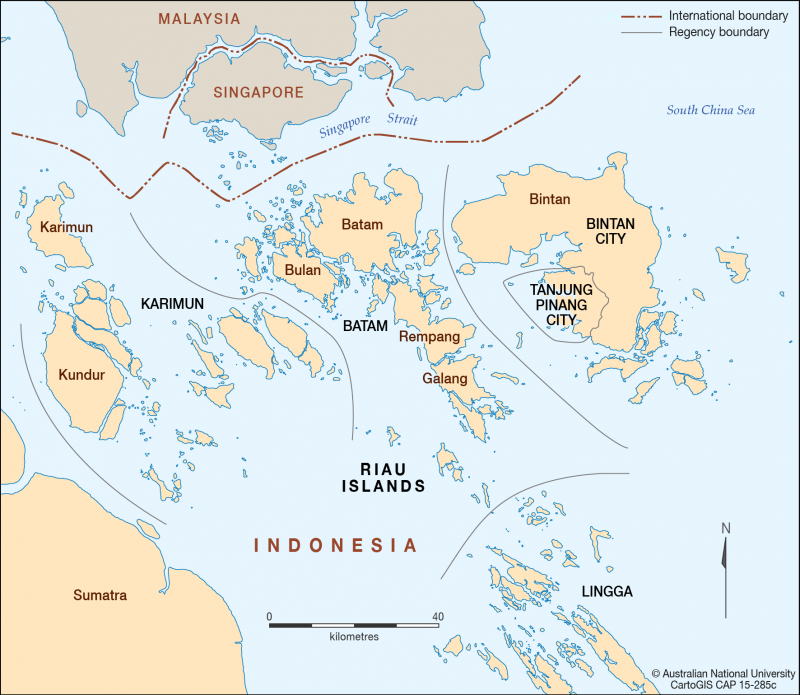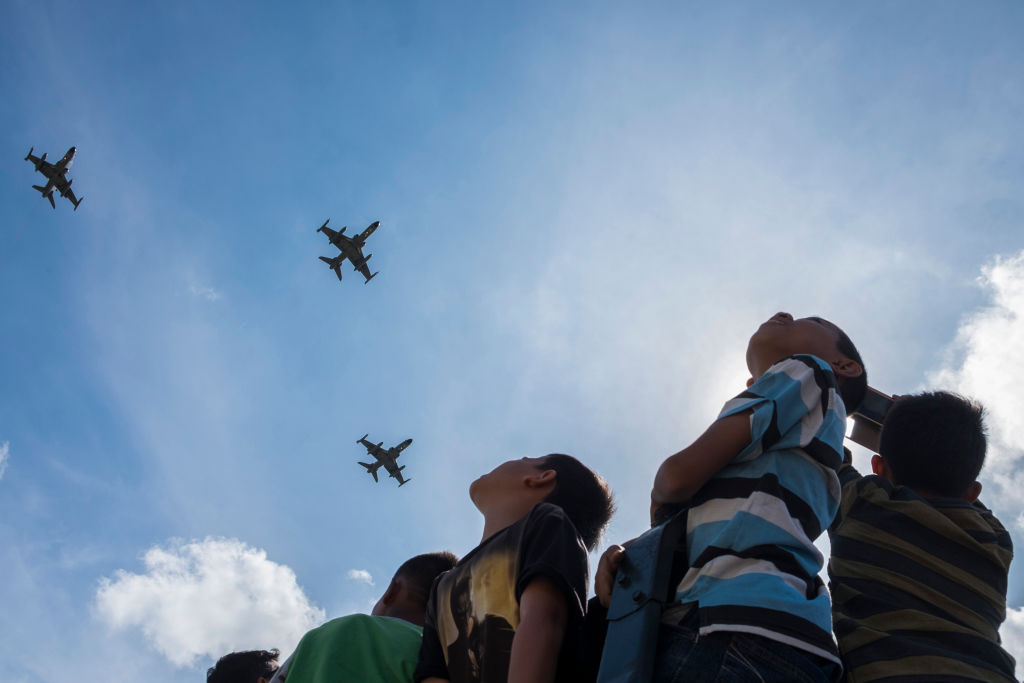Singapore might be tiny, but we do have a fair bit of control of the skies above us.
To our south lies a bunch of Indonesian islands collectively called the Riau Islands.
 Pic from the College of Asia and the Pacific.
Pic from the College of Asia and the Pacific.
Flight Information Region
Singapore happens to control what's known as the Flight Information Region (FIR) over the Indonesian Riau islands.
A 2015 Facebook post by the Ministry of Transport explains what this means:
Singapore was granted the FIR over the Riau Islands by the International Civil Aviation Organization in 1946, long before we became an independent nation, on "operational and technical merits"."FIR is a specific region of airspace in which flight information service and alerting service are provided and managed by an air traffic services authority appointed by the International Civil Aviation Organization. The current Singapore FIR includes our national airspace as well as airspace over parts of Indonesia and the South China Sea."
Indonesia wants it back
This is been a thorn in the side of some Indonesian politicians.
Prime Minister Lee Hsien Loong mentioned during his speech at the PAP convention on Nov. 19 that Indonesian politicians had been "talking about taking back their airspace from Singapore":
"Actually this is not about Indonesia’s airspace, but the Flight Information Region (FIR), which is for managing air traffic. Singapore manages an FIR around Changi Airport and it includes some areas in the Indonesian airspace, and Indonesia wants to take back that FIR. But who controls the FIR is a technical matter of making the best arrangements for air safety.
But unfortunately, it has been politicised and made into an issue of sovereignty and national pride. And when sovereignty and national pride are engaged, that unfortunately makes the problem much harder to solve."
A quick look at previous statements made about the issue show what the PM was talking about.
In Sep. 2015, Indonesian Transport Minister Ignasius Jonan said:
"The President instructed us to prepare better equipment and human resources so that, in three or four years, we can manage our own airspace."
In Oct. 2016, the Riau Islands Legislative Council urged President Jokowi Widodo to take back control of the FIR from Singapore:
"Indonesia’s sovereignty extends to land, airspace and territorial waters. Therefore, the control of airspace above Riau Islands must be discussed again and renegotiated. We will convey this matter to President Jokowi via the defense minister and foreign minister."
[related_story]
And recently on Nov. 30, two former Indonesian military officials, former Chief of Staff of Air Force Marshall (Ret) Chappy Hakim and Chairman of the Air Power Centre of Indonesia Air Vice Marshal (Ret) Koesnadi Kardi, brought up the issue again:
(Translated) "Logically speaking, in general large countries are obliged to help the smaller neighboring countries and not the other way around.
The action that should be taken by Indonesia is to immediately formulate a roadmap in accordance with the Inpres dated September 8, 2015, that Singapore should immediately hand over air space management over the Riau Islands (Natuna and Batam) gradually to Indonesia as the owner of legitimate sovereignty."
It's not about sovereignty
As you can see, the word "sovereignty" gets tossed around a lot when discussing this issue.
Sovereignty is understandably, a touchy issue. But the FIR isn't about sovereignty.
Singapore's Ambassador to Indonesia, Anil Kumar Nayar, wrote a letter to Metro News TV to rebut the claims made by Chappy and Koesnadi.
The letter was also published on the Facebook page of Singapore's Embassy in Jakarta, on Dec. 12.
Nayar emphasises that the statements made by the two Indonesian military officials "misrepresent the facts". The FIR is not about sovereignty but aviation safety, and who can provide the most effective air traffic service.
Nayar also disputed their claim that Singapore keeps the money charged for air navigation services, instead clarifying that:
"All Route Air Navigation Services charges that Singapore collects on behalf of Indonesia are remitted to the Directorate-General of Civil Aviation Indonesia, less the bank transfer costs. And DGCA Indonesia has always found the accounts to be in order."
You can read the full text of the letter below.
In 2015, then-Foreign Affairs Minister K. Shanmugam pointed out that conceding any ground on the FIR could terminally affect our status as an aviation hub:"If there is any change to the agreement, any change that obviously impacts on us as an aviation hub and the jobs in Singapore. There are implications for our position as an aviation hub. We are one of the busiest airports in Asia, aviation hub in this region. Tens of thousands of jobs are dependent on our position as an aviation hub."
So we can expect the government to vigorously defend our position on the FIR.
A domestic audience
But why has this cropped up again?
Well the report from Metro TV News notes that the comments were made at the launch of a book, Enforcing the Sovereignty of Air.
It can't be denied that stirring up controversy is a great way to promote a book and grab people's attention.
However, the strong tone of their comments echoes a populist, nationalist strain in Indonesia that has recently gained strength in Indonesia.
According to this article published by the Asia and the Pacific Policy Studies journal in 2015, the political scene in Indonesia lacks sharp ideological divides, like the ones that exist between the Democrats and the Republicans in the US, for example.
This means politicians in Indonesia, including aspiring ones, turn to nationalism to increase their popular support:
"But in fact, the very thinness and fungibility of nationalism makes it a useful tool for politicians seeking to build popular support in such a denuded ideological landscape."
Indonesian politicians also frequently make reference to "outside threats", despite the fact that Indonesia is in a relatively peaceful region and isn't engaged in conflict with its neighbours.
"One distinctive feature of the contemporary nationalism is its preoccupation with the notion that various (usually unnamed) foreign powers harbour nefarious and hostile designs on Indonesia..casual references to Indonesia being the target of foreign conspiracies, economic or political subjugation, moral or political subversion and the like are all part of mainstream debate in Indonesia and rarely raise an eyebrow when uttered even by ministers or members of parliament."
While the politicians go back and forth, Indonesia's neighbours should keep a close eye on the way the conversation is going.
Top image by Afrianto Silalahi /Barcroft Images / Barcroft Media via Getty Images.
Here are some totally unrelated but equally interesting stories:
We match each of your colleagues to a Christmas gift from The Body Shop to make your life easier
The Body Shop Christmas products for clueless S’porean men, explained
If you like what you read, follow us on Facebook, Instagram, Twitter and Telegram to get the latest updates.
